
Journal of Computational Finance
metrics 2024
Innovating risk management through computational excellence.
Introduction
Journal of Computational Finance, published by INCISIVE MEDIA, stands at the forefront of interdisciplinary research, amalgamating the realms of finance, applied mathematics, and computer science. With its ISSN 1460-1559 and E-ISSN 1755-2850, this journal provides a vital platform for scholars and practitioners alike, aiming to advance methodologies and computational techniques that enhance financial decision-making processes. Although currently categorized in the Q3 quartile across various disciplines—including Applied Mathematics, Computer Science Applications, and Finance—its commitment to quality research is unwavering, as evidenced by its curated selection of innovative studies. The journal’s scope includes computational modeling, algorithmic trading, risk management, and quantitative finance solutions. Each volume seeks to not only foster academic discourse but also bridge theoretical findings with practical applications in the financial industry. Given its convergence from 2011 to 2024, the journal continues to evolve alongside the rapidly changing financial landscape, supporting researchers, students, and professionals in navigating the complexities of computational finance.
Metrics 2024
 0.28
0.28 0.80
0.80 0.90
0.90 16
16Metrics History
Rank 2024
Scopus
IF (Web Of Science)
JCI (Web Of Science)
Quartile History
Similar Journals
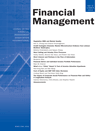
FINANCIAL MANAGEMENT
Empowering Scholars with Cutting-Edge Financial InsightsFINANCIAL MANAGEMENT is a premier academic journal published by Wiley, focusing on the intricate domains of Accounting, Economics, and Finance. With an ISSN of 0046-3892 and an E-ISSN of 1755-053X, this esteemed journal has made significant contributions to the global discourse on financial practices and theories since its establishment in 1996. Situated within the top tier (Q1) in its respective fields, FINANCIAL MANAGEMENT ranks impressively in Scopus, positioned at 30 out of 176 in Accounting and 57 out of 317 in Finance, reflecting its high impact and relevance in the scholarly community. The journal is known for its rigorous peer-review process and publishes cutting-edge research aimed at advancing knowledge and practice in financial management. Although it does not offer Open Access, it remains accessible through institutional subscriptions, ensuring that researchers, professionals, and students remain at the forefront of developments in financial management. With a commitment to excellence, FINANCIAL MANAGEMENT continues to be an indispensable resource for those seeking to deepen their understanding of this critical field.
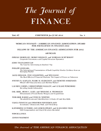
JOURNAL OF FINANCE
Elevating understanding in finance and economics.JOURNAL OF FINANCE, published by Wiley, stands as a premier academic journal in the fields of finance, economics, and accounting. With a history dating back to 1946, the journal has consistently delivered impactful research that shapes financial theory and practice, boasting an impressive impact factor reflective of its high citation rate. Its Quartile 1 ranking in Accounting, Economics and Econometrics, and Finance illustrates its leading position within these disciplines. Although not an open access publication, the journal continues to be indispensable for researchers, professionals, and students seeking to advance their understanding and knowledge through rigorous empirical analysis and comprehensive reviews. With an esteemed global readership, the JOURNAL OF FINANCE remains committed to fostering the dissemination of innovative financial research well into 2024 and beyond.
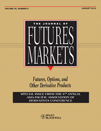
JOURNAL OF FUTURES MARKETS
Connecting Theory and Practice in Financial MarketsThe JOURNAL OF FUTURES MARKETS, published by WILEY, stands at the forefront of research in the fields of accounting, economics, finance, and business management. With an ISSN of 0270-7314 and E-ISSN 1096-9934, the journal has been a key academic resource since its inception in 1981, with content converging up to 2024. It is recognized for its rigorous peer-review process and maintains a strong presence in the academic community, holding a Q2 ranking in multiple categories such as accounting and finance, according to the latest 2023 evaluations. With a reputable Scopus ranking, where it ranks in the 65th percentile for economics and econometrics, this journal is essential reading for researchers, professionals, and students alike who seek to explore the complexities of future markets. While not an open-access publication, it offers various subscription options that make cutting-edge research accessible to a broad audience, fostering a deeper understanding of market dynamics and trends.

FINANCE AND STOCHASTICS
Charting New Territories in Financial ResearchFinance and Stochastics is a leading academic journal published by Springer Heidelberg, focusing on the intricate interplay of finance, probability, and statistics. With an impressive impact factor and ranked within the Q1 category in both finance and statistics, it serves as an essential resource for researchers and professionals seeking to advance their understanding of stochastic modeling in financial contexts. The journal has maintained a strong reputation since its inception, with contributions from renowned scholars worldwide. The editorial team prioritizes high-quality research that addresses contemporary challenges in financial mathematics and extends the boundaries of statistical methods. Nestled in the heart of Germany, Finance and Stochastics embraces a broad scope, inviting submissions that explore innovative approaches to economic theory and quantitative methodologies. This combination of rigorous academic standards and commitment to impactful research makes the journal a pivotal avenue for disseminating knowledge and fostering collaboration in the finance and statistics communities.
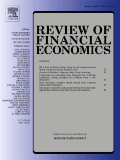
Review of Financial Economics
Unraveling Complexities in Financial EconomicsReview of Financial Economics, published by WILEY, stands as a prominent peer-reviewed journal in the fields of economics and finance. Established in 1994, this journal provides a platform for rigorous research and thoughtful discourse, contributing to the advancement of knowledge in financial theory and its applications. With an HIndex indicative of its citation impact, it ranks in the Q3 quartile for both Economics and Econometrics, as well as Finance, based on the 2023 categorization, underscoring its role in the academic community. Although it does not currently offer Open Access, the journal remains accessible to a wide audience through institutional subscriptions. Researchers, professionals, and students are encouraged to engage with its insightful articles that address contemporary issues and advancements within financial economics, fostering a deeper understanding of the complex interplay between economic systems and financial markets.
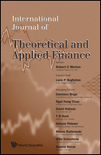
International Journal of Theoretical and Applied Finance
Empowering researchers with a platform for financial excellence.International Journal of Theoretical and Applied Finance is a distinguished publication in the field of finance, serving as a critical platform for the dissemination of innovative research and theoretical insights since its inception in 2003. Published by World Scientific Publishing Co Pte Ltd in Singapore, this journal boasts an impressive Q2 ranking in the realms of Economics, Econometrics, and Finance (miscellaneous) and a solid Q3 status in Finance for 2023. With a commitment to advancing knowledge in the complex world of theoretical frameworks and applied financial practices, it welcomes original research articles, comprehensive reviews, and case studies that explore varied facets of finance. Researchers, professionals, and students benefit from the journal's rigorous peer-review process and an ever-expanding repository of knowledge, making it an indispensable resource in the financial academic community. The journal does not currently offer open access, reflecting its selective approach to publishing high-quality content aimed at a specialized audience.
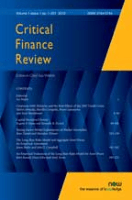
Critical Finance Review
Shaping the future of finance through high-quality research.Critical Finance Review is a premier academic journal dedicated to advancing the field of finance through the publication of high-quality research that spans various dimensions of the discipline. Published by NOW PUBLISHERS INC, this journal has quickly established itself as a leading source of innovative finance scholarship, achieving a notable Q1 classification in the 2023 finance category. Operating under a rigorous peer-review process, the journal ensures the academic integrity and relevance of its content, which attracts contributions from both emerging and established scholars. With an ISSN of 2164-5744 and E-ISSN 2164-5760, it is accessible to a global audience, though it operates under traditional access models. The journal welcomes a diverse range of topics including, but not limited to, risk management, financial markets, and quantitative finance, making it an essential resource for researchers, professionals, and students who are keen to explore the complexities of financial systems and develop new insights in the ever-evolving landscape of finance. Based in the United States, Critical Finance Review holds a significant position within the academic community, fostering a collaborative environment that encourages innovative thinking and practical applications of financial theories.
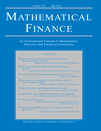
MATHEMATICAL FINANCE
Driving Innovation in Financial MethodologiesMATHEMATICAL FINANCE is a prestigious journal published by Wiley, focusing on the interdisciplinary fields of finance, applied mathematics, accounting, and economics. With its ISSN 0960-1627 and E-ISSN 1467-9965, this journal has earned its place in the top tier of academic publications, reflected by its Q1 rankings across multiple categories in 2023, including Accounting, Applied Mathematics, Economics and Econometrics, Finance, and Social Sciences. MATHEMATICAL FINANCE, which commenced publishing in 1991, is recognized for its rigorous peer-review process and its significant contribution to the advancement of knowledge in quantitative finance methodologies and risk management practices. Although it does not currently offer open access, the journal remains an invaluable resource for researchers, professionals, and students seeking to stay abreast of the latest theoretical advancements and empirical studies in mathematical finance. Its impact factor and Scopus rankings further illustrate its high standing within the academic community, making it an essential platform for impactful research and scholarly discourse.

SIAM Journal on Financial Mathematics
Transforming Financial Challenges into Mathematical SolutionsThe SIAM Journal on Financial Mathematics, published by SIAM PUBLICATIONS, is a premier journal dedicated to the intersection of applied mathematics and finance. With an ISSN of 1945-497X, this journal serves as a vital platform for the dissemination of innovative research that addresses complex financial problems through mathematical modeling and analytical techniques. The journal has established itself within the Q2 quartile in the categories of Applied Mathematics, Finance, and Numerical Analysis, reflecting its influence and significance in these fields. Researchers and practitioners will find a wealth of knowledge spanning topics from stochastic calculus to quantitative finance, making it essential for anyone aiming to advance their understanding of financial mathematics. As the journal continues to converge from 2010 to 2024, it promises to remain a cornerstone resource for academics, professionals, and students alike, facilitating the ongoing dialogue between mathematics and its applications in the financial industry.
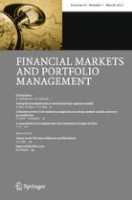
Financial Markets and Portfolio Management
Pioneering Research at the Intersection of Finance and Economics.Financial Markets and Portfolio Management is a renowned peer-reviewed journal published by Springer, focusing on the dynamic and evolving intersections of finance, economics, and accounting. With an ISSN of 1934-4554 and an e-ISSN of 2373-8529, the journal provides a platform for innovative research on financial markets, investment strategies, and portfolio management techniques. It boasts an impactful presence in the academic community, with a Scopus ranking placing it in the 58th percentile in Finance and the 51st percentile in Accounting, underscoring its significance in both fields. Spanning coverage from 2006 to 2024, the journal offers essential insights for researchers, practitioners, and students interested in the latest developments and empirical analyses in financial practices. Although it does not offer open access options, its rigorous editorial standards ensure high-quality content accessible to library and institutional resources. The journal plays a pivotal role in advancing knowledge and fostering dialogue in an increasingly complex financial landscape.